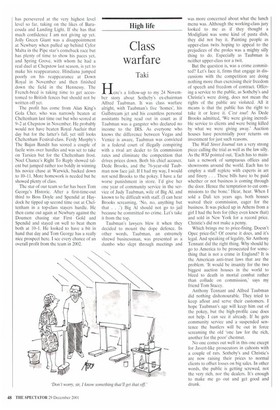Class warfare
Taki
Here's a follow-up to my 24 November story about Sotheby's ex-chairman Alfred Taubman, It was class warfare alright, with Taubman's five 'homes', his Gulfstream jet and his countless personal assistants being read out in court as if Taubman was a gangster who declared no income to the IRS. As everyone who knows the difference between Vegas and Venice is aware, Taubman was convicted in a federal court of illegally conspiring with a rival art dealer to fix commission rates and eliminate the competition that drives prices down. Both his chief accuser, Dede Brooks, and the 76-year-old Taubman now face jail. If I had my way, I would not send Brooks to the pokey. I have a far worse punishment in store. I'd give her one year of community service in the service of Judy Taubman, wife of Big Al, and known to be difficult with staff. (I can hear Brooks screaming, 'No, no, anything but that . . .') Big Al should not go to jail because he committed no crime. Let's take it from the top.
Taubman's lawyers blew it when they decided to mount the dope defence. In other words, Taubman, an extremely shrewd businessman, was presented as a dumbo who slept through meetings and was more concerned about what the lunch menu was. Although the working-class jury looked to me as if they thought a Modigliani was some kind of pasta dish, they did not buy it. Painting people as upper-class twits hoping to appeal to the prejudices of the proles was a mighty silly thing to do. Especially as Taubman is neither upper-class nor a twit.
But the question is, was a crime committed? Let's face it, firms that engage in discussions with the competition are doing nothing more than exercising their freedom of speech and freedom of contract. Offering a service to the public, as Sotheby's and Christie's were doing, does not mean the rights of the public are violated. All it means is that the public has the right to take it or leave it. C'est tout! As Dede Brooks admitted, 'We were giving incredible service to clients and were being killed by what we were giving away.' Auction houses have perennially poor returns on investment for just such reasons.
The Wall Street Journal ran a very strong piece calling the trial as well as the law silly. As the WSJ pointed out, 'Each has to maintain a network of sumptuous offices and showrooms around the world. Each has to employ a staff replete with experts in art and finery . . . These bills have to be paid whether or not business is coming through the door. Hence the temptation to cut commissions to the bone.' Hear, hear. When I sold a Dali ten years ago, both houses waived their commission, eager for the business. It was picked up in Athens from a girl I had the hots for (they even knew that) and sold in New York for a record price. Christie's did not make a penny.
Which brings me to price-fixing. Doesn't Opec price-fix? Of course it does, and it's legal. And speaking of legality, Sir Anthony Tennant did the right thing. Why should he go to America to be prosecuted for something that is not a crime in England? It is the American anti-trust laws that are the problem. 'It would be insanity for the two biggest auction houses in the world to bleed to death in mortal combat rather than collude on commission,' says my friend Tom Stacey.
Anthony Tennant and Alfred Taubman did nothing dishonourable, They tried to keep afloat and serve their customers. I hope Taubman's age will keep him out of the pokey, but the high-profile case does not help. I can see it already. If he gets community service and a suspended sentence the hustlers will be out in force screaming the old 'one law for the rich, another for the poor' chestnut.
No one comes out well in this one except for Javert-like prosecutors in cahoots with a couple of rats. Sotheby's and Christie's are now raising their prices to normal clients to offset losses on big sales. In other words, the public is getting screwed, not the very rich, nor the dealers. It's enough to make me go out and get good and drunk.


























































 Previous page
Previous page